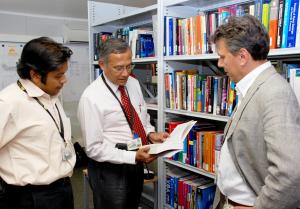Managing ITER publications: a job for the professionals
29 Jun 2012
-
Krista Dulon
Saroj Das, ITER librarian; Dhiraj Bora, chairman of the Publication Board and DDG director of CODAC, Heating & Diagnostics; and Daniele Parravicini, DOC section leader, are charged with ensuring that—before publication—written material follows the proper approval channels.
Behind every large science project, there is a mountain of scientific text published in the form of abstracts, journal articles, papers and presentations.
ITER is no different: since the beginning of conceptual design work and continuing to this day, scientists involved in the project have regularly published scientific and technical updates in academic journals and presented written material at conferences.
The ITER Organization needs to ensure that this material that goes out "in ITER's name" has followed proper review channels and that it does, indeed, accurately represent the project. "Material presented for publication must follow specific ITER Organization procedures," stresses Saroj Das, ITER librarian. "These procedures are meant to verify that the publications contain no copyright or intellectual property issues, and that other legal issues like the disclaimer have been handled properly."
The Document Control Centre at ITER is in charge of publication services. All material to be published—whether authored by ITER Organization staff, or co-authored with Domestic Agency staff or collaborators of the two institutions—must be submitted to an internal review and approval process. These materials are centrally stored for archival purposes, and organized in the ITER Document Management System where authors can keep track of the status and history of each publication.
To ensure that ITER's publication procedure is followed and that publications are in line with the ITER Baseline, a Publication Board has been constituted of technical representatives from every ITER Directorate. Any written material with potential intellectual property or export control implications is forwarded by the Board to the appropriate bodies.
"Our role is an important one, since the material published on ITER in these scientific and technical works is reported to the world," says Dhiraj Bora, chairman of the Publication Board. "We also try to sort out delicate issues such as authorship." The Board Chair, who has the delegated responsibility of approving all ITER-related scientific or technical publications, signs the final Permission to Publish form when the material has completed the internal review process.
For the largest annual or biennial fusion conferences, dedicated review boards are created with representatives of the ITER Organization and the Domestic Agencies. These review boards can receive hundreds of documents. "For the 27th Symposium on Fusion Technology in September (SOFT 2012)," says Saroj, "we have already received 46 abstracts from ITER Organization staff, and 78 abstracts from the Domestic Agencies."
A new class of publication will soon be available through the ITER website. ITER Technical Reports—in-depth documents on scientific and technical activities concerning the project—are aimed toward the broader technical and scientific community. The regular publication of these reports will significantly increase the documentation on the ITER Project accessible through the web.


